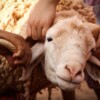The sun beats down and the head swims. Lips are parched. Eyes see spots. Legs list and stagger, barely able to hold up the body’s weight. Everything seems both too bright and too dark at the same time. The heart cries out with a silent scream, “I hate you, I hate you, God of my fathers!” Eventually the lips cry out, too. The stomach gnaws. The leader ahead, that Moses – he is to blame. Moses and that cruel spirit he follows. The misery is unending.
Then the earth seems to move. A thousand snakes emerge from shadows, and they strike. The screams build: banshee cries of pain and bitterness.
“Lift a brazen serpent on a staff,” the cruel spirit tells Moses. “The people must look upon it to be healed.”
And so, the bitter wanderers kneel, angry but desperate. They jut their chins in defiance, but their eyes look up. Their shoulders sag, and they weep.
They don’t know it, but their God weeps, too. Each one of them bears His face – the very image of His beloved Son – but the faces are distorted. They are so degraded, sour and savage that their God-likeness is hard to see. That is why extreme and painful measures have been required to draw the soul-poison from their hearts.
The wandering people have been granted this dramatic intervention because they are Chosen. Their pain is acute, but it is necessary: from them, in the fullness of time, will come the flesh, the culture, the memories, and the stories of the Incarnate God. Their songs and Law and DNA will together be the Ark of the New Covenant and thereby save the world – save the cosmos.
And so they are broken and remade, axed and regrafted, healed of fatal supernatural trauma by the most forceful and desperate methods. It is the only way. And for them, the first step is acceptance. The first step is looking full-on at the twisted reality of their own brokenness and sin, along with its cosmic implications.
We still, all of us, throb and lurch from our inherited supernatural trauma. We labor under the wound and stain of the demonic cloud into which all of us have been born. Modern technology has managed to create a seductive, antiseptic, flickering veneer that conveniently blinds us to our real brokenness; even the best of us long to believe its deceptions. But the truth cries out in the darkness at night: we, too, are wanderers in the desert. We, too, need to face facts. And in facing them, we can finally move toward (painful) healing.
In my contemporary art class this quarter, my students have already wrestled with artists’ chronicles of abuse, murder, exploitation and isolation. They have looked on present-day brazen serpents and wondered if and when the healing can come. The contemporary art world is unique for its immersive embrace of both exterior and interior pain. Sometimes this embrace can seem perverse, laced with schadenfreude. Other times it offers answers that can seem too easy. But a lot of the time, it’s honest in a bracing way.
Are we ready to ask the Holy Spirit where we are broken? Can we face and accept the pain that comes from seeking truth? Most of all, can we accept that our brokenness is not – never was – a matter of insufficient material wealth, thwarted social expectations, or flawed intellectual understanding? No, like the wanderers in the wilderness, our brokenness has always been rooted in our spirits. We all want to be our own gods, approving ourselves and condemning our enemies. Though we can’t admit it, all of us recklessly flee the raking light of true divinity, which shows things as they really are. So much of our sensuality, judgmentalism, tribalism and self-pity is just this: a diversion. They are all ways of dodging the surgical gaze of our uncompromising, holy God.
























Gripping writing style. Powerful. One question/suggestion–you say “the CRUEL spirit tells Moses.” (Num. 21.8) I think the implied antecedent is the people’s view of the spirit, though prima facie perhaps lost.
It is interesting that in time, the people began to worship the crafted bronze (brasen) serpent instead of the real source of power.
“So much of our sensuality, judgmentalism, tribalism and self-pity is just this: a diversion.”
Yes. So sadly true. Thanks, Katie, for a thoughtful and beautiful article.